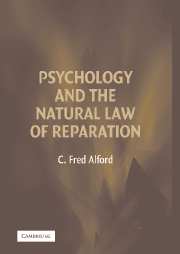Preface
Published online by Cambridge University Press: 24 July 2009
Summary
The idea that Melanie Klein might be a natural law theorist has been marinating with me for some time. That she might actually fulfill the requirements of traditional natural law thinking only came to me after reading and teaching the great Thomist of the twentieth century, Jacques Maritain. I cannot say for certain why, only that while Maritain is a deeply religious man, he locates natural law in a space different from where Aquinas locates the natural law. For Aquinas, natural law remains an aspect of Eternal Law. For Maritain (and some readers will think that I have already tipped my hand), natural law owes almost as much to the phenomenology of his early teacher, Henri Bergson, as it does to Catholic theology. This is so, even if this is not an aspect of the natural law that Maritain talked or wrote about in later years.
Nevertheless, neither Maritain nor any other natural law theorist has paid sufficient attention to natural evil. This is something I always wonder about when I go to conferences where people try hard to convince one another that the natural law exists. Or if it doesn't, then universals such as those written about by Kant or Rawls must. Or if not that, then at least the moral sentiments must exist, such as those written about by Adam Smith and David Hume. But if that's true, then why do people generally behave so badly?
- Type
- Chapter
- Information
- Psychology and the Natural Law of Reparation , pp. vii - xPublisher: Cambridge University PressPrint publication year: 2006

